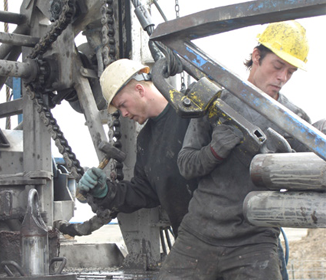The trucking industry is quite interesting in that there are not only many different types of trucks and drivers but the work itself is interesting. Even when looking at oil field trucking jobs, many of the same types of positions would be available although there is one very important difference.
When comparing conventional truck driving jobs with oil field trucking jobs, those associated with the oil and gas industry typically pay more. However, there is a reason for this in that the type of driving is more dangerous because of freight being hauled. Drivers for oil companies would also drive short hauls or local routes, as well as long hauls, which means over-the-road and long distances.
The really great news beyond excellent pay is that jobs are in abundance, especially for certain types of haulers and in some geographic locations. Therefore, for the person looking to find a great job in the oil industry but who has no engineering type experience, working one of the many oil field trucking jobs might be a consideration.
Job Market
Although the oil and gas industry was hit hard by the recent economic downfall, it has not only recovered but is now thriving. Because of this all types of workers are needed. Most people are still unaware of the amount of crude oil being produced in the United States, with the majority being hauled by drivers to intended markets.
As a driver transporting product, oil would be picked up in an 18-wheeler followed by being delivered to terminals or refineries. Today, a number of smaller to mid-sized trucking companies handle work such as this, providing people with options. For larger companies with open oil field trucking jobs, some of the finest include Permian Crude Transport, Coastal States, Tesoro Petroleum, and Koch Industries.
Now, along with oil field trucking jobs involving transportation of crude oil, other driving related jobs exist. For example, a vacuum truck driving job would be one that moves brine water or salt used for the majority of the country’s oil wells. These trucks would transport the liquid to facilities with disposal wells. Although the work is quite different, both jobs are in demand and the pay is similar for both.
Job Requirements
At minimum, anyone interested in oil field trucking jobs would need a high school diploma or GED although a college education would be preferred, especially with studies relating to the oil and gas industry. With this, a Class A commercial driver’s license would be required and for anyone hauling crude oil, the hiring company would mandate both drug screen testing and a passed physical examination. This person would also need a driving record without blemish, meaning no DWIs within a specific timeframe and no excessive number of speeding tickets.
While hauling oil or oil related products would be the foundation for oil field trucking jobs of all types, some of the other job responsibilities might differ. For instance, as a part of job duties, some drivers must lift and carry extremely heavy equipment so it would be essential to be in good physical condition. Although there are many openings for oil field trucking jobs for drivers that already have the necessary license, special schools can teach most anyone in preparation for this career.
Because most oil field trucking jobs mean hauling hazardous or flammable liquids, any school considered should provide training for this specific type of hauling. This would mean looking for driving schools that have special HAZMAT training, which is actually common. Training for this would involve learning about different materials being hauled, potential risks, things to avoid, and so on ensuring the safety of the driver, people around the driver, and the product itself.
Driving Responsibilities
Of course, the exact responsibilities associated with oil field trucking jobs would vary to some degree based on the company, type of load, and even the driver. However, we wanted to provide some of the things that any driver for this industry would be responsible for handling. When hauling crude oil, drivers have the responsibility of measuring, calculating, and recording product amount, make a record of product denied, and log all details of the delivery.
Because a tiny spark could create a massive explosion, specialized training is mandatory for the following steps.
- Hauling the load, short or long distances
- Measuring amount of oil in the tank using a gauge line and tank thief to get a sample
- Test the fluid extracted, add chemicals, and spin the centrifuge for certain analysis of basic sediment and water in the sample of oil extracted
Here are some articles about some job profiles regarding oil rigs:

